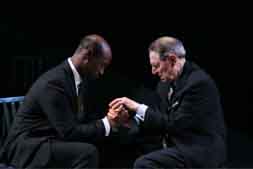
Paulanne Simmons
"The Conscientious Objector" Explores
the Man Behind the King Myth
 |
| DB Woodside and John Cullum in "The Conscientious Objector" Photo by Theresa Squire |
"The Conscientious Objector"
Directed by Carl Forsman
Keen Company
The Clurman Theater @ Theatre Row
410 West 42nd St. between 9th and 10th avenues
From March 4, 2008
Tues. 7 p.m., Wed. thru Sat 8 p.m., Sun. 2 p.m.
$40 (212) 279-4200
Closes April 19, 2008
Reviewed by Paulanne Simmons March 15, 2008
Forty years after the assassination of Martin Luther King Jr., he has become so much a saint, a legend and a martyr that the real man is lost beneath a mountain of myth. Into this fog where fantasy and fact mingle strides Michael Murphy's "The Conscientious Objector," a brilliant and timely dramatization of those final years when King took his courageous stand against the war in Viet Nam.
The play is director by the young and talented director Carl Forsman. It features the towering John Cullum as President Johnson and DB Woodside making his New York theater debut as Dr. King. This is the second collaboration between Murphy, Forsman and Cullum [the first was "SIN(A Cardinal Deposed) for the New Group]. One can only hope Woodside will also continue his association.
By choosing to present not King's work in the Civil Rights Movement but his anti-war activities, Murphy illuminates King at his most controversial, not only in the eyes of the white population and its leaders but also with many black people and King's colleagues in the movement: Whitney Young (Harold Surratt), Andrew Young (James Miles), and Ralph Abernathy (Bryan Hicks).
There is much in "The Conscientious Objector" that is common knowledge: Johnson's fury at King's disloyalty; J. Edgar Hoover's bugging of King's home, office and hotel rooms; King's infidelities; the role Stokely Carmichael played in alienating whites from blacks and blacks from each other.
But there is also much that is completely new even to those of us who lived through those times: Coretta Scott King's insistence that her husband take a stand against the war; King's vacillation and personal doubts; Johnson's physical and mental decline and his personal agony over the war.
In his notes for the program, Murphy admits he took some liberties in creating this dramatization of historical events, but he also stresses that "the play has been guided by the historical record." Whatever Murphy's deviations from fact, in the end, truth is undeniable served.
One might suppose that the power of this play would rest on Woodside's intense and nuanced portrayal of King. Indeed it is quite wonderful to see the human as well as the humane side of the reverend, to hear him curse, to witness a fleeting moment of guilt with Coretta (the very fine Rachel Leslie), to see him immobilized by uncertainty as his wife helps him get dressed over the phone. But it soon becomes apparent that Murphy has a much broader vision. Even his minor characters are painted and portrayed with great skill.
Jimonn Cole injects tremendous energy into the play as the overwrought and unstable James Bevel, the prime mover in redirecting King's attention to the anti-war movement. And newcomer Chad Carstarphen ignites the stage as the volatile Carmichael, who almost single-handedly derailed the movement.
If King is the moral core of "The Conscientious Objector," then quiet surprisingly, Johnson is the emotional core. This is partly due to the writing, but much more to Cullum's magnificent and sensitive portrayal of one of the most controversial figures of the mid-twentieth century. His LBJ is coarse, canny and domineering, but he is never hypocritical or uncaring. When LBJ mourns the dead soldiers, laments the pain his wife must feel, and struggles with the two unacceptable possibilities of losing the war or giving up, it is impossible not to believe in his suffering.
It is, of course, tempting to compare the situation in Southeast Asia during the sixties to boondoggle we are in today. This is entirely valid and valuable. But, to his enormous credit, Murphy has avoided all self-righteous "I-told-you-so's" and "we-should have-known-better's." Instead, he has chosen to tell a profound and moving story, and lets his audience draw their own conclusions.

| lobby | search
| home | cue-to-cue |
discounts | welcome | film
| dance | reviews |
| museums | NYTW
mail | recordings | coupons |
publications | classified |